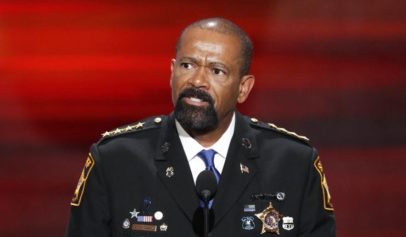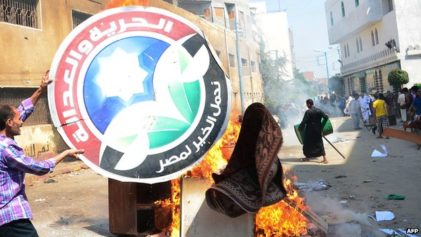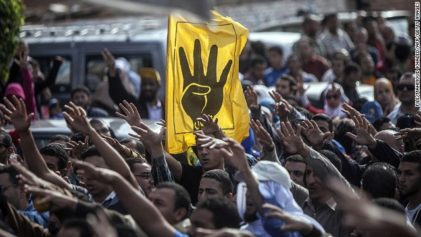
outside police headquarters after bomb
Chaos and carnage in Egypt erupted once again Friday as a car bomb detonated right outside Cairo’s main police headquarters and tore through the building, killing five people and also wrecking the nearby important Museum of Islamic Art.
The attack came the day before the third anniversary of the 2011 uprising that toppled Hosni Mubarak but put the country on its current path of instability and violent conflict between the Muslim Brotherhood and the military-backed Egyptian government forces, which were responsible for the ouster July 3 of Islamist President Mohammed Morsi.
About two hours after the police headquarters blast, a second bomb struck a police car on patrol near a metro station in the capital’s Dokki district on the other side of the Nile River. One person was killed and eight others were wounded. A third smaller blast at a Talbiya police station about two miles from the famous Giza Pyramids exploded but caused no casualties, officials said.
The violence set off the typical spate of charges and counter-charges by the two sides. While there was no immediate claim of responsibility, Islamic militants have been targeting police and the military with bombings and shootings. In addition, an al-Qaida-inspired group just the day before released an audio message warning police and soldiers they will be targeted in a wave of violence unless they defect.
While authorities have accused the Brotherhood as being behind the violence, the Brotherhood has called the accusation baseless.
Still, it was clear after today’s violence that on the streets the sentiment among the people is that the Brotherhood is responsible. Egyptians are increasing siding with the military in the country’s clash.
After the police headquarters bombing, a crowd outside the building chanted slogans against the Brotherhood and in support of army chief Gen. Abdel-Fattah el-Sissi, who ousted Morsi and who military supporters now want to run for president.
“Execution for Morsi and his leaders,” one man shouted through a megaphone, according to the AP, while a woman held up a picture depicting the Brotherhood as sheep and screamed, “Morsi is the butcher and el-Sissi will slaughter him.”
Later in the day, clashes between the two sides around the city left at least three protesters dead.
Interior Minister Mohammed Ibrahim, who is in charge of police, called the bombings a “vile terrorist act.” He said their clear intent was to spread panic ahead of Saturday’s pro-military rallies.
Without naming the Brotherhood, he said, “They will reach a point where coexistence will be impossible.”
“But people will only increasingly insist … and join the masses in millions” on Saturday, he told reporters outside the bombed police headquarters.
For its part, the Brotherhood condemned the attacks and suggested the security forces themselves were behind it to justify an even wider crackdown. The Brotherhood called the bombings “a prelude to unjust, dangerous decisions.”
Authorities initially characterized the attack on the headquarters as a suicide bombing, but later it became apparent that the bombers may have escaped before the blast. Security officials said that three to five people pulled up to the headquarters in two vehicles — a car and a pick-up truck loaded with explosives—and the truck’s drivers appeared to have fled in the second car before detonating the truck by remote control.
Abdullah el-Sayyed, a 26-year-old salesman who lives behind the headquarters, said he was woken up by the blast.
“They were devastated. They were firing their guns in panic as if to call for rescue,” he said of the panicked policemen. He told the AP he plans to return to his home village in Fayoum south of Cairo because he no longer feels safe.
“It’s not worth it anymore to stay here. Every day I ride the metro and go past here,” he said.
As for the renowned Museum of Islamic Art, windows were blasted out all the way up the facade of the building, which was built in 1881 and recently underwent a multimillion-dollar renovation. Antiquities minister Mohammed Ibrahim told the AP artifacts inside were damaged, including a rare collection of Islamic art objects, and that the museum will have to be rebuilt.


